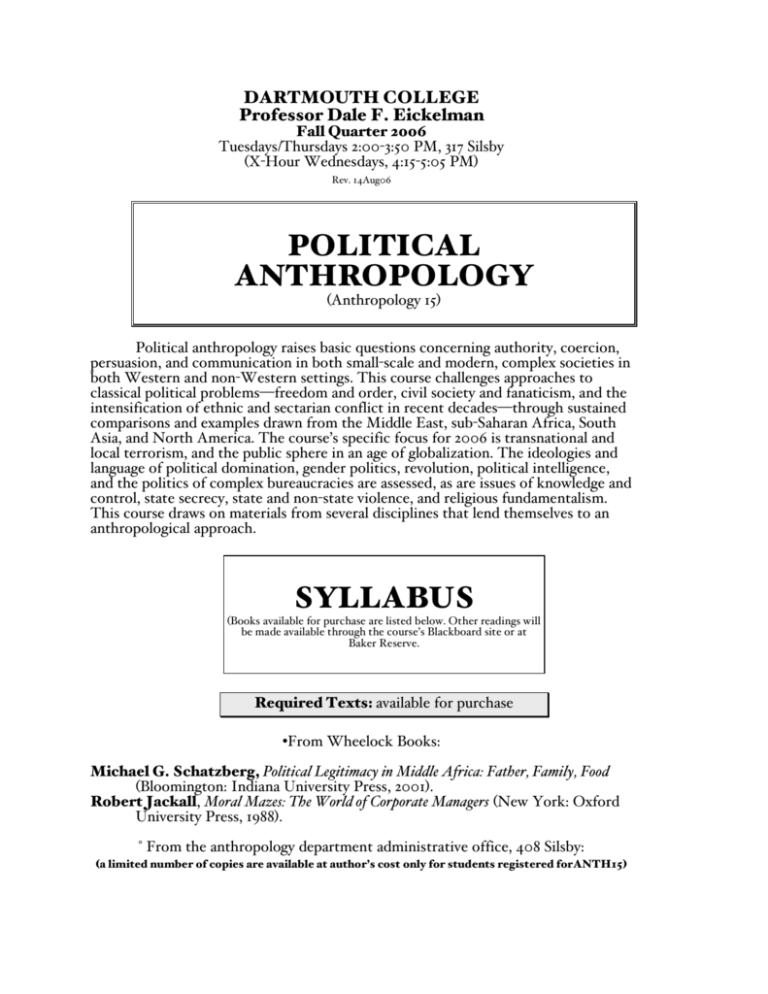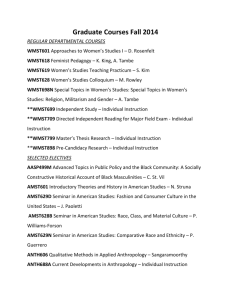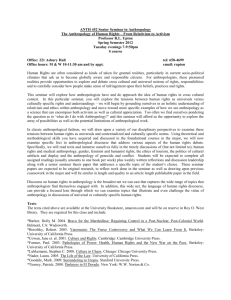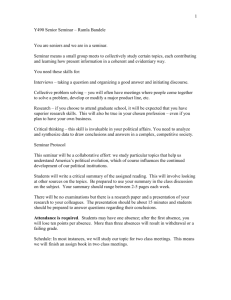POLITICAL ANTHROPOLOGY SYLLABUS
advertisement

DARTMOUTH COLLEGE Professor Dale F. Eickelman Fall Quarter 2006 Tuesdays/Thursdays 2:00-3:50 PM, 317 Silsby (X-Hour Wednesdays, 4:15-5:05 PM) Rev. 14Aug06 POLITICAL ANTHROPOLOGY (Anthropology 15) Political anthropology raises basic questions concerning authority, coercion, persuasion, and communication in both small-scale and modern, complex societies in both Western and non-Western settings. This course challenges approaches to classical political problems—freedom and order, civil society and fanaticism, and the intensification of ethnic and sectarian conflict in recent decades—through sustained comparisons and examples drawn from the Middle East, sub-Saharan Africa, South Asia, and North America. The course’s specific focus for 2006 is transnational and local terrorism, and the public sphere in an age of globalization. The ideologies and language of political domination, gender politics, revolution, political intelligence, and the politics of complex bureaucracies are assessed, as are issues of knowledge and control, state secrecy, state and non-state violence, and religious fundamentalism. This course draws on materials from several disciplines that lend themselves to an anthropological approach. SYLLABUS (Books available for purchase are listed below. Other readings will be made available through the course’s Blackboard site or at Baker Reserve. Required Texts: available for purchase •From Wheelock Books: Michael G. Schatzberg, Political Legitimacy in Middle Africa: Father, Family, Food (Bloomington: Indiana University Press, 2001). Robert Jackall, Moral Mazes: The World of Corporate Managers (New York: Oxford University Press, 1988). ° From the anthropology department administrative office, 408 Silsby: (a limited number of copies are available at author’s cost only for students registered forANTH15) Eickelman/Political Anthropology An15/2003 2 Dale F. Eickelman and James Piscatori, Muslim Politics, new ed. (Princeton: Princeton University Press, 2003). (Cash or check for $15.00 [authors’ price] payable to “Dale F. Eickelman.” At this price, the book is available only to students registered for the course and is not returnable. To purchase the book at retail price with return privileges, please visit the Dartmouth Bookstore or Wheelock Books.) Some readings are available from the course’s Blackboard website (BB) or from Baker Reserve (BR). Course Requirements Lectures and seminar discussions complement course readings, so that readings should always be completed prior to the date on which they are discussed. Part of every class session is set aside for discussion and comment. Course grades will be determined by: (1) a take-home midterm examination [35%]; (2) in-class oral presentations, role-playing, and discussions [15%]; (3) when indicated with a “pound” (#) sign on the syllabus, a one-page, typed set of discussion questions based on the session’s readings that will be submitted two hours prior to the seminar [15%]; and (4) a course paper in lieu of a final examination (see below). The course paper, based on the selected supplementary course readings chosen in conjunction with the instructor, is preceded by a seminar presentation, consists of 2,500 words, and is due at 2:00 PM on Thursday, 30 November 2006 [35%]. This course assumes an understanding of the contents of Dartmouth's booklet, Sources: Their Use and Acknowledgment. You were provided a current edition of this booklet on entry to Dartmouth. It is also available at <www.dartmouth.edu/~sources>. In addition, an “Essay on Essays” will be distributed early in the course; its contents form an integral part of course requirements. Students with medical or learning disabilities, including “hidden” disabilities, should consult with the instructor prior to 5 October to discuss appropriate accommodations. This course is run as a seminar. Regular class attendance and participation is essential. Your grade will be adversely affected if you miss class sessions, including utilized x-hours, and it is your responsibility to find out from classmates what occurred in your absence. Do not take this course if you anticipate outside commitments that preclude regular attendance or missing more than two class sessions. Office Hours: Tu 8:00-9:30 AM; Th 4:00-5:30 PM, and other hours by appointment only, in 413C Silsby. E-mail messages will generally be answered on the same day. “Blackboard”: This course has a secure website on which some course materials will be made available. Eickelman/Political Anthropology An15/2003 3 Class Presentation and Final Paper Beginning the week of 2 October and ending on the 12th, I will arrange meetings with all seminar participants to discuss themes for case studies that will match your individual interests with seminar topics. By 31 October, but very likely earlier, each seminar participant will formally propose a case study that builds directly on seminar topics and that uses anthropological monographs based on field research. The examples of selected themes are too diverse to mention here, except to say that all papers must be built on anthropological monographs that involve field research on political ideas and practices. Examples of such books include Robert Hefner, Civil Islam: Muslims and Democratization in Indonesia (2005), or, for those interested in Africanist social anthropology, Evans-Pritchard’s classic The Nuer (1940). Examples of possible topics include anthropological studies of formal and informal political authority, peasant resistance, the Sendero Luminoso (Peru), the Mafia in Italy, Jewish religious extremism in Israel, Muslim politics and the state in the Middle East, ethnic nationalism, and identity and cultural politics in Ceauçescu’s Romania. The scope for presentations is wide in terms of geography and topic. To ensure balance in the seminar and the choice of monographs appropriate to the course, monograph selection will be done in consultation with me and subject to my agreement. Since this is a seminar, presentations will be coordinated so as to achieve appropriate scope and distribution of topics. Participants who propose a topic and obtain approval early in the course will have priority over someone who proposes a topic at a later time. These seminar presentations are an integral part of the course, and the seminar format will afford many opportunities to raise issues related to your chosen theme as the course progresses. For those interested in the politics of the Muslimmajority world and Muslims in Egypt, 0ne lively and accessible source for ideas is the ISIM Review (www.isim.nl, then click on “ISIM Review), formerly known as the ISIM Newsletter. There is no final examination in this course, but the seminar presentation/term paper is expected to indicate a comprehensive understanding of seminar issues and themes. Participants may propose joint seminar presentations and papers. A carefully chosen case study can serve as the springboard for a subsequent multi-term project. In prior years, some participants have developed projects that subsequently developed into honors theses or senior fellowships. 1. Introduction (21 September 2006). There will be no course readings for 21 September. The course readings for 26 September, however, should be done prior to the assigned date. Assignments for 26 September: Submit the first one-page set (#) of two key questions based on the above readings. Eickelman/Political Anthropology An15/2003 4 Also prepare a short biographical statement that will be posted on “Blackboard,” our class-only website and shared with other participants in the class. 2. What is Politics? (26 September, 27 September [x-hour]). (#) Read for 26 September: Jonathan Spencer, “Post-colonialism and the Political Imagination,” Journal of the Royal Anthropological Institute 3, no. 1 (March 1997): 1-19 (BB). David D. Laitin, Hegemony and Culture: Politics and Religious Change among the Yoruba (Chicago: University of Chicago Press, 1986), pp. 171-205 (BB). Read for 27 September: Dale F. Eickelman and James Piscatori, Muslim Politics (Princeton: Princeton University Press, 2003), pp. 3-21. 3. Religion and Gender in the Public Sphere (28 September, 3 October, 4 October [x-hour], 5 October. View (28 September): “Divorce, Iranian Style,” (advised by Ziba MirHosseini, BBC 1998). (#) Read (for 3 October): Fariba Adelkhah, “Framing the Public Sphere: Women in the Islamic Republic,” in Public Islam and the Common Good, edited by Armando Salvatore and Dale F. Eickelman (Leiden: Brill, 2004), pp. 227-41 (BB). Ziba Mir-Hosseini, Islam and Gender: The Religious Debate in Contemporary Iran (Princeton: Princeton University Press, 1999), pp. 3-20 (BB). View (4 October x-hour): “Women in the Sun,” directed by Sobhi alZobaidi (Refugee Camp Productions, 1999), 57 minutes. (#) Read (for 5 October): Schatzberg, Political Legitimacy, pp. 174-200. Eickelman and Piscatori, Muslim Politics, pp. 80-107. 4. The Public Sphere and the State (10 October, 12 October). (#) Read (for 10 October): Eickelman and Piscatori, Muslim Politics, pp. 2279. (#) Read (for 12 October): Schatzberg, Political Legitimacy, pp. 1-70. Michael Warner, “The Mass Public and the Mass Subject,” in Habermas and the Public Sphere, ed. Craig Calhoun (Cambridge MA: MIT Press, 1992), pp. 377-401 (BB). Robert D. Putnam, “Bowling Alone: America’s Declining Social Capital,” Journal of Democracy 6, no. 1 (January 1995), pp. 65-78 (BB). Eickelman/Political Anthropology An15/2003 5 5. New Media, Religious Violence, and the Public Sphere (17 October, 19 October, 24 October, 26 October) (#) Read (for 17 October): Eickelman and Piscatori, Muslim Politics, pp. 108-64. Stanley J. Tambiah, “Reflections on Communal Violence in South Asia,” Journal of Asian Studies 9, no. 4 (November 1990): 741-60 (BB). The mid-term examination essay will be distributed at the end of class on 17 October. Please make certain that your readings are up-to-date. Including all readings and videos through Thursday, 19 October, it will be due at the beginning of class on Tuesday, 24 October. View (in class, 19 October): James Piscatori, “Nationalism and Religion in the Modern World” (video, 1996). View (in class, 24 October): “We Can Give Up Our Lives, But We Can’t Break Our Vow” [Pranh jha hu vachnu na jaye], Jain Studios, 1992, Hindi, 55 mins., translation and story board provided by Dr. Christian Brosnius, Universität Heidelberg, Germany]. The “story board” is on BB. Read (for 24 October): Christiane Brosius, “Hindutva Intervisuality: Videos anf the Politics of Representation,” Contributions to Indian Sociology (n.s.) 36, nos. 1-2 (2002): 265-95 (BB). View (in class, 26 October): An al-Qa‘ida-produced DVD (ca. May 2001) on the state of the Muslim world and the destruction of the USS Cole and excerpts from several subsequent al-Qa‘ida presentations. Only students registered for the class will be allowed to view these DVDs and it will not be possible to screen them at a later time. Read (for 26 October): Dale F. Eickelman, “First Know the Enemy, Then Act.” In Anthropologists in the Public Sphere: Speaking Out on War, Peace, and American Power, ed. Roberto V. Gonzalez, pp. 214-18 (Austin: University of Texas Press, 2003) (BB). This chapter originally appeared as an op-ed in the Los Angeles Times on December 9 2001, Page A12. Bruce Hoffman, Inside Terrorism (New York: Columbia University Press, 1998), pp. 131-55 (“Terrorism, the Media, and Public Opinion”) (BB). Martha Brill Olcott and Bakhtiyar Babajanou, “The Terrorist Notebooks” Foreign Policy, March/April 2003 pp. 30-40 (BB). Eickelman/Political Anthropology An15/2003 6. Authority and Persuasion in Formal Organizations (31 October, 2 November, 7 November). (#) Read (for 31 October): Robert Jackall, Moral Mazes: The World of Corporate Managers (New York: Oxford University Press, 1988), pp. 1100, 191-206. This book will be used on 7 November for a roleplaying exercise. James C. Scott, “Domination, Acting, and Fantasy,” in The Paths to Domination, Resistance, and Terror, ed. Carolyn Nordstrom and JoAnn Martin (Berkeley and Los Angeles: University of California Press, 1992), pp. 55-84 (BB). Schatzberg, Political Legitimacy, pp. 201-21. (#) Read (for 2 November): Jackall, Moral Mazes, pp. 101-61. 7. Authority and Deniability: Deception and the Control of Secret Knowledge (8 November [x-hour]). (#) Read (for 8 November): Robert Jervis, “Improving the Intelligence Process: Informal Norms and Incentives,” in Intelligence: Policy and Process, ed. Alfred C. Maurer, Marion D. Tunstall, and James M. Keagle (Boulder and London: Westview Press, 1985), pp. 113-24 (BB). This article is the “sanitized” (i.e., approved for publication) version of an internal CIA report made after the fall of the Shah in Iran in 1979. The only change for publication was deletion of reference to the CIA. Our interest in the article is the insight that it provides to the sociology of “secret” political knowledge. Central Intelligence Agency, “Inspector General’s Survey of the Cuban Operation, October 1961,” Top Secret No. 173040 (declassified). 9. Seminar Presentations (9 November, 21 November, 28 November, 29 November [x-hour, if needed]). Specific assignments and the time allocation for these class sessions will be posted on “Blackboard.” Seminar papers are due 2:00 P.M., Monday,4 December. 6








